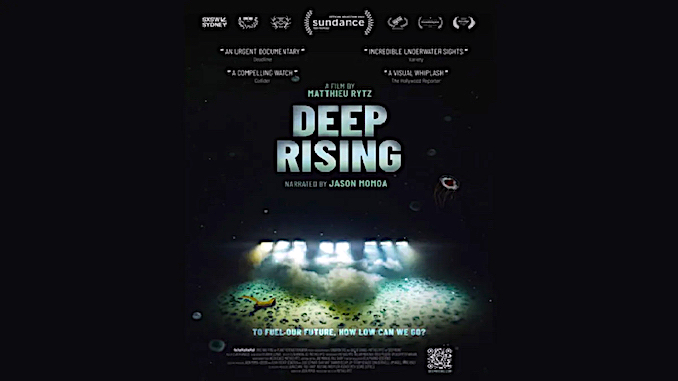
“The seabed is humanity’s birthright, not a resource for the profit of just a few.”
~ Deep Rising website
As we witness the accelerating grab for our planet’s land and mineral resources in places like Western North Carolina, and we hear the new president make unsubtle hints about Canada and Greenland, the 2023 documentary Deep Rising calls attention to the “Wild West” race to mine deep seabed mineral resources in international waters.
The question posed to the viewer is whether nodules containing rare-earth minerals such as cobalt and nickel should be harvested from the deep seabed; importantly, the film also asks who should run such operations and enjoy the benefits. Viewers learn some interesting history, including the fact that Lockheed Martin led a consortium back in the 1970s to explore deep-sea mining possibilities. (Lockheed held onto its deep-sea mining subsidiary, UK Seabed Resources, until 2023, when it sold it to a Norwegian firm.) In 1982, the UN Convention on the Law of the Sea established the obscure International Seabed Authority (ISA), putting ISA in charge of deep seabed regulations (such as they are) and mineral rights.
Unfortunately, Deep Rising is littered with climate change one-liners (e.g., “the ocean is our biggest ally in fighting climate change”) and features numerous NGO and corporate representatives running around promoting deep-sea mining as compatible with the UN’s Sustainable Development Goal 14: “Conserve and sustainably use the oceans, seas and marine resources.” In fact, the film’s narrator, American actor Jason Momoa, is the official UN ambassador for SDG 14, and it was the “climate crisis” that first prompted Deep Rising’s director, Canadian filmmaker and visual anthropologist Matthieu Rytz, to make films about the oceans.
Championing the “green” perspective in the corporate sphere is the Metals Company, which went public in 2021 through a special purpose acquisition company (SPAC) after being founded in 2011 as DeepGreen Metals. The Metals Company claims that “Producing these metals from [deep-ocean] polymetallic nodules could reduce most of the Environmental, Social, and Corporate Governance (ESG) costs of conventional metal production.”
Still, it is difficult to disagree with Rytz’s reminder that the deep seabed in the high seas is “the common heritage of humankind” and that a plundering is underway that may jeopardize that heritage.
DEEP RISING | OFFICIAL TRAILER
Related:
Deep Rising (documentary)
Deep Rising (website)
Q&A with Environmental Filmmaker Matthieu Rytz
Critical Mineral Resources (U.S. Geological Survey)
views: 1185
